Young-gunning for $1 million
Bennett breaks the bank and the records
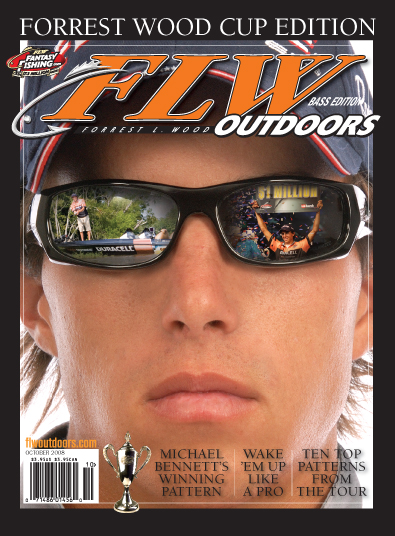
If what is junk to one man is treasure to another, Duracell pro Michael Bennett of Lincoln, Calif., found a virtual scrapyard of finny riches roaming the shallows of South Carolina’s Lake Murray during the 2008 Forrest Wood Cup presented by BP and Castrol.
Relying largely on gut instincts instead of a proven pattern during the four-day event, Bennett mined the 52,000-acre reservoir located near Columbia for 19 bass that collectively weighed 52 pounds, 3 ounces.
Back-to-back limits in the opening rounds gave Bennett the lead after day two. And more importantly, they earned him one of only 10 tickets that were punched to continue the quest for professional bass fishing’s richest prize – $1 million.
With weights zeroed for the all-important finals, Bennett was a picture of consistency as he grabbed the lead on day three with his heaviest limit yet – 16 pounds, 1 ounce. He then followed it up with four bass weighing 8-4 on the final day to distance himself from second-place finisher Dave Lefebre of Union City, Pa., by more than 5 pounds.
In doing so, Bennett instantaneously became an official member of professional bass fishing’s millionaire club – a lofty feat many pros spend a lifetime trying to accomplish. Making the achievement even more noteworthy is the fact he pulled it off at such a young age.
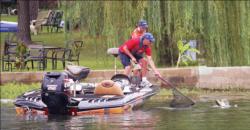 Bennett, who turned 24 in May, is the youngest angler to win the Forrest Wood Cup and earn a $1 million payday.
Bennett, who turned 24 in May, is the youngest angler to win the Forrest Wood Cup and earn a $1 million payday.
If experience comes with age, Bennett is likely to be a force to be reckoned with among professional bass fishing ranks for years to come. And he dropped some strong hints throughout the season to support that claim.
In only his fourth year on the Walmart FLW Tour, the personable pro racked up top-10 finishes in two of six qualifying events in 2008, including his first tour-level win on Alabama’s Lewis Smith Lake in April.
Bennett’s resume also includes a top 10 in the Walmart FLW Series East-West Fish-Off at Lake Amistad in Texas last February, where he handily defeated Kellogg’s pro Jim Tutt of Longview, Texas.
It was that event that earned Bennett an early ticket to the 2008 Forrest Wood Cup. Of course, at the time, he had no idea how important the ticket would become six months later. But it did start him on a roll that ultimately culminated in the life-altering experience of having Ranger Boats founder Forrest Wood hand him a massive $1 million check to hold up to a huge crowd gathered in the Colonial Center, followed soon after by a real $1 million check from FLW Outdoors chairman Irwin Jacobs.
“It still hasn’t sunk in yet,” Bennett said the morning after being crowned the 2008 Forrest Wood Cup champion. “Even if I had finished last in this tournament, I could still look back and say I had a great year. There are no words to describe what it feels like for it to end this way. It is simply an incredible dream year for anybody. I feel very fortunate.”
Modest words for a guy who just beat out 76 of the world’s top bass anglers and pocketed a million bucks. Right?
Not really. Just call it vintage Michael Bennett. The amicable Western pro has quietly gained the respect 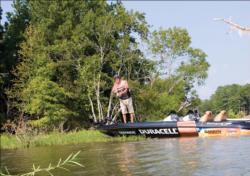 of his peers, as well as industry brass, with a likable demeanor some might say symbolizes a cross between a house cat, junkyard dog and field-trial champion.
of his peers, as well as industry brass, with a likable demeanor some might say symbolizes a cross between a house cat, junkyard dog and field-trial champion.
Off the water, Bennett is quiet, polite and unassuming. But on the water, he is a fierce competitor who knows how to think on his feet, stay cool under pressure and sniff out bass with the best of them.
The game plan Bennett hatched, and subsequently followed, to reel in the $1 million prize at Lake Murray exudes those traits, along with a high level of confidence he has in himself. Even when he is flying by the seat of his pants and hunting a pot of gold under some of the toughest conditions imaginable, he is one pro everyone needs to keep an eye on.
Pretournament perceptions
Bennett approached the Murray event with an open mind, just like he does every tournament. He spent roughly four days on the water during pre-practice before the lake went off-limits, and he then returned for the official practice period hoping to build on what he had already learned.
“I did a lot of driving and looking before the cutoff, and it benefitted me in this event,” Bennett said. “Columbia had been having some unseasonably cool weather before the cutoff, and I found quite a few fish cruising in the shallows. There were wolf packs of 3- to 7-pounders just roaming. I tried fishing deep but couldn’t get bit. But every time I would go shallow, I would see fish cruising and get one or two to bite. At that point, I was pretty sure there were enough fish shallow to win.”
The only questions on his mind were: Would the mild weather persist? And would the fish stay shallow if it didn’t?
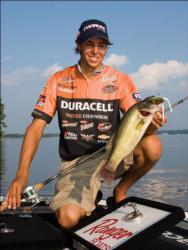 Bennett figured the wolf packs would vacate the shallows if more summerlike conditions set in, which is exactly what happened.
Bennett figured the wolf packs would vacate the shallows if more summerlike conditions set in, which is exactly what happened.
Several 100-degree-plus days were recorded in Columbia during the 12-day off-limits period, sending surface temperatures into the upper 80s and low 90s. Daytime highs topping 90 degrees during all but one of the four practice days only kept the water boiling.
With the heat wave, Bennett spent a considerable amount of his practice time trying to nail something down deep, and he ultimately found about 10 spots where he thought he could catch fish on a drop-shot or shaky head.
He also spent a little time fishing shallow, but didn’t develop much confidence there. That is, until thick clouds and light rain rolled in on the last day of practice ahead of a nasty storm system – a system that would drop the air temperature and turn the Forrest Wood Cup into a shallow-water junk-fishing hoedown, with Bennett playing lead fiddle.
“I spent five or six hours deep, and I could tell something wasn’t right – things were changing with the weather,” Bennett said. “I decided to go shallow for a couple of hours to check some places where I caught some solid fish on a frog during pre-practice.”
The move produced a 3-pounder that was holding around a patch of alligator grass in about 3 feet of water. With the weather coming in, that bass clued Bennett into a shallow bite that he would explore at the start of the tournament – just to see what happened.
“I felt pretty confident I could fill out my limit deep if it didn’t work out,” he said.
Day one: Five bass, 11-15
Bennett’s decision to go skinny with his amphibious friend turned out to be a good one. Tossing a hollow-bodied Snag Proof Fred Frog, which is a custom variation of the Bobby’s Perfect Frog, he had three keepers in the box at 9 a.m., including a 2 1/2-pounder and a 3 1/2-pounder that ate on back-to-back casts around alligator grass in 2 to 3 feet of water. The other fish, a 12-incher, busted a Berkley PowerBait Bat Wing Frog buzzed past a willow.
Bennett’s fourth keeper, a solid 3-pounder, came about an hour later off the same willow that produced the frog fish during practice. “I’m pretty sure it was the exact same fish,” he said.
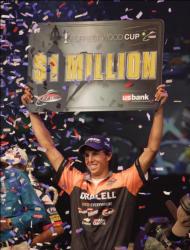 With four solid fish in the livewell, Bennett elected to test some of his deep stuff. But when it didn’t pan out, he eventually moved back shallow and used an oxblood light red fleck Berkley Power Finesse Worm Hand Pour rigged on a drop-shot to finish out his limit with a 1 1/2-pounder. He entered the second day in 10th place.
With four solid fish in the livewell, Bennett elected to test some of his deep stuff. But when it didn’t pan out, he eventually moved back shallow and used an oxblood light red fleck Berkley Power Finesse Worm Hand Pour rigged on a drop-shot to finish out his limit with a 1 1/2-pounder. He entered the second day in 10th place.
Day two: Five bass, 15-5
Bennett committed to fishing shallow for at least half the day, and the decision paid off nicely by uncovering the pattern that would eventually carry him the distance – large stretches of boat docks with grass.
Keying on all new water, Bennett used the Snag Proof frog to catch a 15-5 limit that was anchored by a 6-pounder. The fish were relating to narrow shade pockets located between grass mats and docks.
“I finished out my limit at 11:15 a.m. and knew I had made the cut,” Bennett said. “I felt like these were resident fish that wouldn’t replenish, so at that point, I took a long boat ride and went looking for new places (for day three) that matched the criteria for what I needed to catch fish. I really felt like new water was the key.”
Day three: Five bass, 16-1
Bennett estimated he made 30 to 40 stops and burned nearly two tanks of gasoline on day three en route to converting six frog bites into a limit. But it was worth it. The 16-pound, 1-ounce limit gave him a 2-13 lead over Keebler pro Dave Lefebre heading into the final round.
But as good as he felt about his chances going into the final day, he was equally concerned about burning up most of his “new” water. Gearing up for the biggest day of his young fishing career, Bennett had some serious decisions to make.
“I had already fished about 80 to 90 percent of the best-looking stuff, and it had me worried,” Bennett 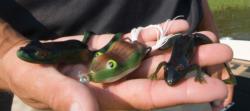 said. “My only two options were to go back to some of my best stretches and hope there were more fish hanging around, or to hit a few smaller stretches with fewer docks.”
said. “My only two options were to go back to some of my best stretches and hope there were more fish hanging around, or to hit a few smaller stretches with fewer docks.”
Day four: Four bass, 8-4
Bennett’s first stop was the same stretch of water that produced the bulk of his weight on day two. He fished it for about an hour and finally boated a 1 1/2-pounder at 8:30 a.m. on the hollow frog.
Roughly 90 minutes passed before Bennett caught his second keeper – another 1 1/2-pounder – from the mouth of a narrow pocket. His biggest fish of the day, a 3 1/2-pounder, exploded on the frog less than 10 minutes later.
Then the surface bite waned. Bennett ran dozens more spots over the next four hours and let his frogs dance across any stage that looked the part. But he never found another taker.
“I fished my butt off, stopped close to 50 times, burned nearly two tanks of gas and ran my trolling motor batteries dead,” Bennett said. “I fished harder than I ever have. If it looked halfway decent, I fished it.”
With time running short, and still two fish shy of a limit, Bennett elected to make a change at about 2:30 p.m. He ran 20 minutes up the Saluda River to a bridge that produced a few small keepers during pre-practice. Within 10 minutes, he caught a 3-pounder on a shaky head rigged with the Berkley Power Finesse Worm Hand Pour.
“I had hoped to catch a couple of 12-inchers up there, so I considered that fish to be a complete bonus fish,” Bennett said. “As it turned out, I didn’t need it to win. But I sure was glad to have it at the time.”
Bennett raced back down the lake and made the trek back to the convention center. There, he became bass fishing’s newest millionaire and joined the elite company of fellow pro Scott Suggs as one of only two instant-millionaire winners in professional fishing.
His pattern may have been a little more solid than most junk fishing, but it proved to be a gold mine of treasure for Bennett.